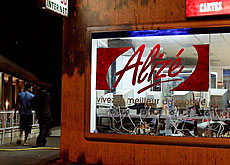NGOs disappointed with internet accord

Civil society groups in Tunis are disappointed with the decision to leave control of the internet in the hands of the United States.
Under a compromise reached on the eve of the World Summit on the Information Society (WSIS), a California-based organisation will remain in charge of the web.
Icann, the non-profit Internet Corporation for Assigned Names and Numbers, was set up by the US Department of Commerce in 1998 to take over a number of internet-related tasks including managing the assignment of domain names.
In Tunis it was agreed that an internet governance forum would be set up to debate the future structure of the net. This would include civil society actors and businesses, but its decisions would not be binding.
Non-governmental organisations (NGOs) seem divided on the benefits of such a forum.
“This was presented as a ‘summit of solutions’,” said Chantal Peyer from Bread for All, a Swiss NGO. “But still there is a clear lack of political will by rich countries.”
But Sally Burch from the Latin American Information Agency described it as a step in the right direction. “It is a good result for our participation in the summit process, it is a way for civil society to have a say,” she said.
But for others that is not enough.
“The WSIS speaks in a vague way of the internet as a facility. We believe it is a universal public provision which should be available to all,” said Anita Gurumurthy from the Indian association IT for Change.
Voluntarism
The debate on financing poor countries’ digital infrastructure has been far less satisfactory.
“The positions of the European Union and US are incoherent. Western countries do not want to commit any additional money, but prefer to operate within the existing funding mechanisms, which is not enough,” Peyer said.
“It came out that only national governments of developing countries are responsible for bridging the digital divide,” she added. “It seems there is no notion of international cooperation and coordination.”
While developing countries were asking for a clear mandate for the United Nations to take action on implementation and monitoring, countries in the developed world – and especially the US – oppose any strong language on concrete commitments and implementation measures.
The buzzword for the post-WSIS phase seems to be “voluntarism”.
The Digital Solidarity Fund to raise resources to bridge the digital divide has been set up, but participation is voluntary. France is the only rich country that has committed financial support.
Post-WSIS
NGOs are calling for an active civil society role in the post-WSIS phase. “We will monitor what will be done and put pressure on governments, and continue to work on national and international issues excluded from the summit agenda,” Burch said.
NGOs also plan to pursue the link between the UN Millennium Development Goals and new technologies. “There is room for a public policy agenda on development,” Peyer said.
“Governments recognised that not enough has been done so far to include rural areas. Now official WSIS documents mention the need for public investment and policies for access in rural and disadvantaged areas, and we will start to move forward from there,” she added.
On Wednesday a civil society working group began to draft an alternative statement to be adopted on Friday by the final civil society plenary assembly.
Stefania Milan, InfoSud (adaptation for swissinfo: Thomas Stephens)
After Geneva in 2003, the second phase of the World Summit on the Information Society (WSIS) is taking place in Tunis from November 16-18.
The aim of the summit is to bridge the digital divide between rich and poor nations, as well as tackle issues such as internet governance.
A compromise document on control of the internet has been approved unanimously after several months of heated and fruitless negotiations.
In the document any follow-up discussions on internet governance are left to independent forums, whose decisions will not be binding.
The first such forum is to be held in Greece next year.

In compliance with the JTI standards
More: SWI swissinfo.ch certified by the Journalism Trust Initiative













You can find an overview of ongoing debates with our journalists here . Please join us!
If you want to start a conversation about a topic raised in this article or want to report factual errors, email us at english@swissinfo.ch.